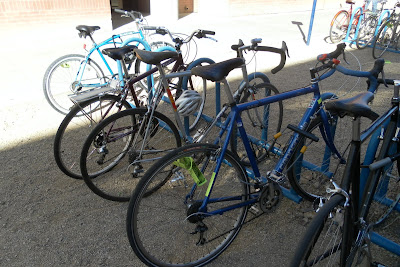
Last week, I attended a city council zoning commission hearing. I attended this meeting with other members of the Living Streets Alliance. This was the culmination of weeks of efforts on the part of Tucson Velo, the Living Streets Alliance and a variety of other local activists.
The reason we were at this meeting was bicycle parking policy. The city was trying to pass a revision to the city zoning code that would push bike parking to the periphery of certain developments. The specific section of code states that in certain situations, business owners could push bike parking as far as 75 feet away from the front door. The current maximum is 50 feet; 50 feet is the national standard. Locating a bike rack 75 feet from the door of a business could could result in bike racks being placed in an unsafe side of building location. The lack of visibility would probably result in much lower usage of these facilities as well, making them a waste of money.
 Picture from Tucson Velo; taken at the City Council meeting
Picture from Tucson Velo; taken at the City Council meetingFirst, the good: the city council voted to extend the vote for another two weeks so the needs of the bicycle community could be discussed and met. As Tucson Velo later reported, this resulted in a compromise between the city and bike representatives.
Now, the irony: this zoning code was primarily about reducing parking minimums! I was unaware of this fact before walking into this meeting. After hearing this zoning revision discussed, I could only imagine how the city council felt: here was a group of stakeholders who probably wanted these parking minimums to begin with, protesting the passing of a really progressive zoning policy. I hope, and think, they understood where we were coming from.
Why pass an imperfect policy if we could make it better? This, after all, is the whole point of the democratic process. However, the city council was wondering why this problem wasn't hashed out during the multi-month long process of the development of this zoning amendment. This process included many bike related stakeholders as well.
One theory: Jason Wong, a developer who was pushing really hard for the city council to pass the zoning revision that very night. Some believe that he stuck in the regressive bike parking exemption at the last minute.
Whatever the reason, the city council meeting was fascinating. The whole process, from the introductory Pledge of Allegiance to colorful local city residents speaking up about various issues, was eye opening. This was my first Tucson city council meeting and it probably will not be my last.
It was encouraging to see democracy work effectively to resolve conflicts between stakeholders. I think we sometimes forget that the ineffective federal Congress is not the only governing body in the country. Local level government is filled with passionate people who intimately understand the local issues. I am happy to report that the Tucson city council, at least in this example, is of the people, by the people and for the people.

No comments:
Post a Comment